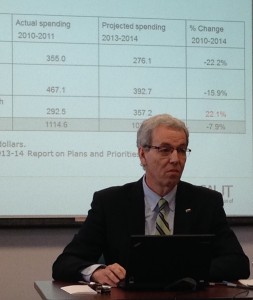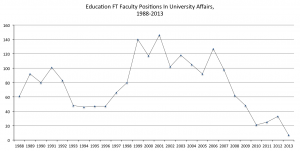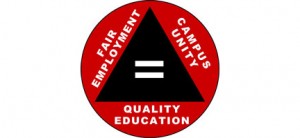Listen to Class Struggle, Ira Basen’s documentary of the plight of part-time faculty in Canadian universities.
Ira Basen, CBC, September 7, 2014– Kimberley Ellis Hale has been an instructor at Wilfrid Laurier University in Waterloo, Ont., for 16 years. This summer, while teaching an introductory course in sociology, she presented her students with a role-playing game to help them understand how precarious economic security is for millions of Canadian workers.
In her scenario, students were told they had lost their jobs, their marriage had broken up, and they needed to find someplace to live. And they had to figure out a way to live on just $1,000 a month.
What those students didn’t know was the life they were being asked to imagine was not very different than the life of their instructor.
According to figures provided by the Laurier Faculty Association, 52 per cent of Laurier students were taught by CAS in 2012, up from 38 per cent in 2008. (Brian St-Denis (CBC News))
Hale is 51 years old, and a single mother with two kids. She is what her university calls a CAS (contract academic staff). Other schools use titles such as sessional lecturers and adjunct faculty.
That means that despite her 16 years of service, she has no job security. She still needs to apply to teach her courses every semester. She gets none of the perks that a full time professor gets; generous benefits and pension, sabbaticals, money for travel and research, and job security in the form of tenure that most workers can only dream about.
And then there’s the money.
A full course load for professors teaching at most Canadian universities is four courses a year. Depending on the faculty, their salary will range between $80,000 and $150,000 a year. A contract faculty person teaching those same four courses will earn about $28,000.
Full time faculty are also required to research, publish, and serve on committees, but many contract staff do that as well in the hope of one day moving up the academic ladder. The difference is they have to do it on their own time and on their own dime.
Precariat
The reality of Kimberley’s life would be hard for most students to grasp.
‘I never imagined myself in this position, where every four months I worry about how I’m going to put food on the table.’– Kimberley Ellis Hale, instructor
For them, a professor is a professor. How could someone with graduate degrees who teaches at a prestigious university belong to what sociologists now call the “precariat, ” a social class whose working lives lack predictability or financial security?
It’s a question that Kimberley often asks herself.
“I never imagined myself in this position,” she says in an interview at her home later that day, “where every four months I worry about how I’m going to put food on the table. So what I did with them this morning is try to get them to think, ‘Well what if you were in this position?’”
Contract faculty
In Canada today, it’s estimated that more than half of all undergraduates are taught by contract faculty.
Not all of those people live on the margins. In specialized fields like law, business and journalism, people are hired for the special expertise they bring to the field. They have other sources of income. And retired professors on a pension sometimes welcome the opportunity to teach a course or two.
But there are many thousands of people trying to cobble together a full-time salary with part-time work.
They often teach the large introductory courses that tenured faculty like to avoid. They put in 60- to 70-hour weeks grading hundreds of essays and exams, for wages that sometimes barely break the poverty line.
It’s what Kimberley Ellis Hale calls the university’s “dirty little secret.”
Our universities are rightly celebrated for their great achievements in research. That’s what attracts the money, the prestige and the distinguished scholars. But the core of the teaching is being done by the most precarious of academic labourers.
And without them, the business model of the university would collapse.
Enrollment at Canadian universities is soaring (up 23 per cent at Laurierover the past decade, for example). And while most universities are still hiring tenure-track faculty, they aren’t hiring enough to match the growing student population. So classes are getting bigger, and more “sessional” instructors are being hired.
“It helps financially,” concedes Pat Rogers, Laurier’s vice-president of teaching. “If you can’t afford to hire a faculty member who will only teach four courses, you can hire many more sessional faculty for that money.
“Universities are really strapped now. I think it’s regrettable, and I think there are legitimate concerns about having such a large part-time workforce, but it’s an unfortunate consequence of underfunding of the university.”
Read More: CBC, “Most University undergrads now taught by poorly paid part-timers”


 Follow
Follow


